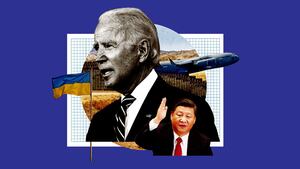The holiday season should have been a time of festivity—but for the Armenians of Nagorno-Karabakh (known as Artsakh in Armenian), each passing day is a fight for survival.
For nearly a month, Azerbaijan has enforced a blockade along the only road linking the Armenian enclave of Nagorno-Karabakh to the Republic of Armenia—severing the region’s only lifeline to the outside world.
As a result, over 120,000 Armenians are now facing critical shortages of food, medical supplies, and fuel. Patients in critical care have been unable to be transported to Armenia for life-saving treatment, already resulting in one death. And for the first week of the blockade, Azerbaijan cut off the gas supply—leaving the region without its primary source of heating at the onset of winter.
The blockade began on Dec. 12, 2022, when a group of self-described “eco-activists” staged a demonstration along the Lachin Corridor, claiming Artsakh’s government was “illegally” extracting gold and copper molybdenum and using the road to transport those minerals to Armenia.
But this farcical attempt by Azerbaijan to obscure its culpability for enforcing the blockade isn’t fooling anyone. Not only would this protest have the singular honor of being the first in Azerbaijan’s modern history that its kleptocratic authoritarian regime hasn’t sought to brutally suppress—the explicit links many of the so-called activists have with the ruling regime, the presence of military personnel in the crowds, and the overtly nationalist rallying cries of the demonstrators bely their purported objectives.
Azerbaijan’s goal is clear—to assert its control over the region by suffocating and starving the Armenian people to the brink of extinction. For the Armenians of Artsakh, this is nothing new.

Azerbaijani servicemen stand guard at a checkpoint at the Lachin corridor, the Armenian-populated breakaway Nagorno-Karabakh region's only land link with Armenia, as Azerbaijani environmental activists protest against what they claim the illegal mining, on Dec. 27, 2022.
Tofi Babayev/AFP via Getty ImagesSince the collapse of the Soviet Union, Azerbaijan has been relentless in its attempts to subjugate the Armenian enclave. In the 1990s, the Armenians of Karabakh—then an autonomous oblast under Soviet Azerbaijan’s administrative control—declared their independence in response to Baku’s discriminatory policies and escalating anti-Armenian violence across the country. An ensuing war resulted in Artsakh securing its self-governance, and a ceasefire agreement that held until September 2020—when Azerbaijan abandoned decades of multilateral diplomacy and launched a war of territorial conquest.
After a barbaric campaign saw Azerbaijan’s systematic perpetration of war crimes and human rights abuses—including unlawful strikes against homes, schools, churches and hospitals, the execution of civilian captives, and the ethnic cleansing of over 70 percent of Artsakh’s territory—the war ended with a Russia-brokered ceasefire agreement. But even since the end of active hostilities, Baku’s campaign of terror has been a daily reality for the Armenian people.
Over 40,000 Armenians were forcibly displaced and are unable to return to their homes, while more than 100 Armenian prisoners of war remain in Azerbaijan’s illegal detention—where they have been subject to torture)" href="https://urldefense.com/v3/__https://www.hrw.org/news/2021/03/19/azerbaijan-armenian-pows-abused-custody__;!!LsXw!QDy5TCO5rRr8Wevxcin7JGtTt72DIJJq2KNEqp7nVpjWQU2DmjzaxnY5wJ-eEWGmZgPv0CFq6JOmgqssIfbnGTTKj9A$">torture and psychological abuse. Armenian cultural heritage sites in areas captured by Azerbaijan have been systematically desecrated and destroyed)" href="https://urldefense.com/v3/__https://www.nytimes.com/2020/11/30/opinion/armenia-azerbaijan-monuments.html__;!!LsXw!QDy5TCO5rRr8Wevxcin7JGtTt72DIJJq2KNEqp7nVpjWQU2DmjzaxnY5wJ-eEWGmZgPv0CFq6JOmgqssIfbnTSWjeAU$">destroyed. And just this past September, Azerbaijan launched an incursion into Armenia’s sovereign territory—perpetrating horrific war crimes, including the mutilation of female Armenian soldiers and the execution)" href="https://urldefense.com/v3/__https://www.hrw.org/news/2022/10/14/video-shows-azerbaijan-forces-executing-armenian-pows__;!!LsXw!QDy5TCO5rRr8Wevxcin7JGtTt72DIJJq2KNEqp7nVpjWQU2DmjzaxnY5wJ-eEWGmZgPv0CFq6JOmgqssIfbnzoGPxAc$">execution of several unarmed Armenian prisoners of war.
Not only has Azerbaijan not been held accountable for these unabated acts of aggression—it has been consistently rewarded by the international community in spite of its conduct.
This is because the U.S. and EU see Azerbaijan as a crucial partner in the diversification of Europe’s energy supply—a means to relieve the continent of its dependence on Russian energy after Russia’s illegal invasion of Ukraine.
To induce Baku’s support, the Western powers have offered generous incentives. Earlier this year, Brussels committed)" href="https://urldefense.com/v3/__https://ec.europa.eu/commission/commissioners/2019-2024/varhelyi/announcements/remarks-commissioner-varhelyi-during-joint-press-conference-minister-foreign-affairs-azerbaijan_en__;!!LsXw!QDy5TCO5rRr8Wevxcin7JGtTt72DIJJq2KNEqp7nVpjWQU2DmjzaxnY5wJ-eEWGmZgPv0CFq6JOmgqssIfbnIvzuG1Y$"> committed to investing over 2 billion euros into Azerbaijan’s energy sector, and—against the backdrop of its blockade—recently)" href="https://urldefense.com/v3/__https://www.reuters.com/business/energy/four-leaders-sign-agreement-bring-green-azeri-energy-europe-2022-12-18/__;!!LsXw!QDy5TCO5rRr8Wevxcin7JGtTt72DIJJq2KNEqp7nVpjWQU2DmjzaxnY5wJ-eEWGmZgPv0CFq6JOmgqssIfbnw8O_FHI$">recently facilitated a new regional energy deal with Baku.
The U.S., for its part, has allocated hundreds of millions of dollars in security assistance to Azerbaijan. In the 1990s, Congress passed Section 907 of the FREEDOM Support Act which explicitly prohibited the provision of assistance to Azerbaijan over its aggression against Armenia and Artsakh, and its blockade of the region during the first Nagorno-Karabakh war. But in an attempt to enlist its support for U.S. military operations in Afghanistan (and later, Iraq), an amendment was introduced that allowed the president to waive Section 907 restrictions when deemed in the U.S. national security interest.
In the years immediately preceding the 2020 Nagorno-Karabakh war, over $120 million in direct military assistance was allocated to Azerbaijan. And although that decision was strongly criticized)" href="https://urldefense.com/v3/__https://joebiden.com/2020/10/28/nagorno-karabakh-statement-by-vice-president-joe-biden-2/*__;Iw!!LsXw!QDy5TCO5rRr8Wevxcin7JGtTt72DIJJq2KNEqp7nVpjWQU2DmjzaxnY5wJ-eEWGmZgPv0CFq6JOmgqssIfbnVOClGcQ$"> criticized by Joe Biden while on the campaign trail, his administration has twice since reauthorized military aid to Baku—despite the egregious war crimes and human rights abuses perpetrated during its assault on Nagorno-Karabakh in 2020.
In the West’s calculation, Armenian lives are a fair price to pay for Azerbaijan’s energy.
But while Russia’s invasion of Ukraine may have served as the impetus for this renewed investment in Azerbaijan, it’s also what makes the West’s support for Azerbaijan all the more unconscionable.
If the objective of U.S. policy in the region is to counter Russia’s capacity to wage its expansionist war against Ukraine, it’s hard to see how emboldening Azerbaijan amidst its expansionist assault on Armenia can achieve that.

Protesters hold a giant Armenian flag as they attend a rally in Stepanakert, capital of the self-proclaimed Nagorno-Karabakh region of Azerbaijan, on Dec. 25, 2022.
Davit Ghahramanyan/AFP via Getty ImagesWhile the EU and U.S. have been determined to portray Azerbaijan as a “trustworthy)" href="https://urldefense.com/v3/__https://www.theguardian.com/world/2022/jul/19/human-rights-groups-criticise-eus-azerbaijan-gas-deal__;!!LsXw!QDy5TCO5rRr8Wevxcin7JGtTt72DIJJq2KNEqp7nVpjWQU2DmjzaxnY5wJ-eEWGmZgPv0CFq6JOmgqssIfbnHNsmiZA$"> “trustworthy” energy partner, Baku’s actions tell a different story. Even with the inducements and impunity afforded by the West, Azerbaijan continues to expand its energy cooperation with Russia. Earlier this year, Moscow expanded)" href="https://urldefense.com/v3/__https://www.reuters.com/business/energy/russias-lukoil-spends-15-bln-raise-stake-azeri-gas-project-2022-02-18/__;!!LsXw!QDy5TCO5rRr8Wevxcin7JGtTt72DIJJq2KNEqp7nVpjWQU2DmjzaxnY5wJ-eEWGmZgPv0CFq6JOmgqssIfbnaxDBKTE$"> expanded its stake in Azerbaijan’s major gas fields to 20 percent—making it one of the single largest stakeholders (after British Petroleum) in Azerbaijan’s flagship project in the “diversification” of Europe’s energy supply. And earlier this month, Russia’s Gazprom committed to supply)" href="https://urldefense.com/v3/__https://eurasianet.org/azerbaijans-russian-gas-deal-raises-uncomfortable-questions-for-europe__;!!LsXw!QDy5TCO5rRr8Wevxcin7JGtTt72DIJJq2KNEqp7nVpjWQU2DmjzaxnY5wJ-eEWGmZgPv0CFq6JOmgqssIfbnCNxIhXo$"> supply Azerbaijan with a billion cubic meters of natural gas in order to meet domestic demand.
Not only has this cast doubt over Azerbaijan’s ability to meet Europe’s needs, but also its commitment to cutting Moscow out of Europe’s energy supply chain. Azerbaijan’s duplicitous collusion with Russia demonstrates a point that should be self-evident—that it’s impossible to contain one expansionist authoritarian regime by empowering and enabling another.
While the U.S. may see the continued provision of military assistance to Azerbaijan as a small price to pay to secure its immediate support in the containment of Russia, the decision to embolden and enrich a belligerent authoritarian regime amidst its brazen assault on one of the region’s only democracies could not stand further at odds with Washington’s purported commitment to democracy and human rights.
In order for the Biden administration to demonstrate consistency in its response to countering authoritarian expansionism, it must act to ensure urgent humanitarian assistance is provided to Artsakh’s besieged population—and impose material costs on Azerbaijan to deter its unabated aggression. This should include the enforcement of restrictions on the provision of military assistance to Azerbaijan, and the imposition of targeted sanctions on Azerbaijani officials involved in the commissioning of war crimes. The U.S. must make clear to Azerbaijan that its attempts to impose demands on Armenia through coercion, intimidation, and the use of force is unacceptable.
When President Biden recognized the Armenian Genocide in 2021, it came with a pledge to “renew our shared resolve to prevent future atrocities from occurring anywhere in the world”. Now, as the legacy of the Armenian Genocide once again rears its ugly head, the United States has an opportunity to live up to that promise, or risk “never again” becoming little more than an empty slogan.
The costs of inaction could not be higher. Not only would the failure to hold Azerbaijan accountable effectively greenlight this genocide of attrition against the Armenians of Artsakh—it would demonstrate the limits of Washington’s ability to keep its despotic allies in check, and signal its willingness to abandon at-risk communities to the whims of regional autocrats when geopolitically expedient.










